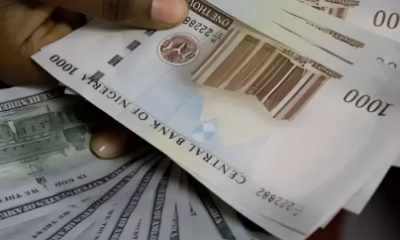Naira has recorded a marginal drop at the official market to N1,461.90 per dollar on the first trading day in the month of February 2024.
This is despite the Central Bank of Nigeria’s (CBN) removal of foreign exchange (FX) cap from the International Money Transfer Operators (IMTOs) and ordered banks to sell excess dollars.
This represents a marginal decline of 0.43% or N6.31 weaker than N1,455.59 it traded the previous day according to data from the NAFEM where forex is officially traded.
This despite analysts’ optimism that the new FX rules by the apex bank would shore up dollar supply from commercial banks and stabilise naira in the immediate terms.
The Central Bank of Nigeria (CBN) had the previous day released a new circular addressing suspected cases of excessive foreign currency speculation and hoarding from Nigerian banks.
The domestic currency depreciated 0.43% to close at N1,461.90 to a dollar on the first day of February 2024.
This represents an N6.31 gain or a 0.43% decrease in the local currency compared to the N1,455.59 closed on Wednesday.
The intraday high recorded was N1526/$1, while the intraday low was N891/$1, representing a wide spread of N635/$1.
According to data obtained from the official NAFEM window, forex turnover at the close of the trading was $156.86 million, representing an 17% increase compared to the previous day.
READ ALSO: Naira recovers slightly, trades at N1,455.59/$1 at official market
Earlier on Thursday, the exchange rate between the naira and dollar appears to have rallied at the black-market trading at around N1450/$1 according to some sources.
Some however quoted at around N1,515 per dollar when we inquired as strong demand on the parallel market, also known as the black market, continued to dictate prices and cause disparate pricing.
The volatility continues despite analysts’ optimism that the new FX rules by the apex bank would shore up dollar supply from commercial banks and stabilise naira in the immediate terms. However, market analysts suggest it is still early days.
The Central Bank of Nigeria (CBN) recently released a new circular addressing suspected cases of excessive foreign currency speculation and hoarding from Nigerian banks.
The new circular introduces a set of guidelines aimed at reducing the risks associated with these practices.

 Entertainment5 days ago
Entertainment5 days ago
 Health1 week ago
Health1 week ago
 Health4 days ago
Health4 days ago
 Football1 week ago
Football1 week ago
 Football1 week ago
Football1 week ago
 Crime4 days ago
Crime4 days ago
 Crime1 week ago
Crime1 week ago
 Education6 days ago
Education6 days ago













